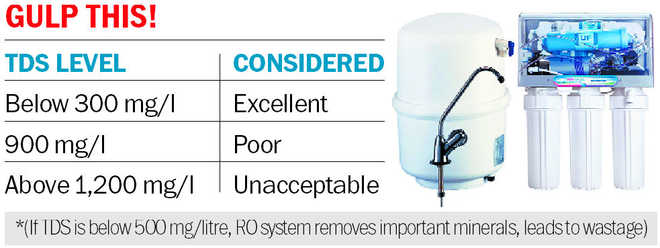New Delhi, May 28
In a bid to regulate the use of RO purifiers, NGT has directed the government to prohibit them where total dissolved solids (TDS) in water are below 500 mg per litre and sensitise public about the ill effects of demineralised water.
The tribunal has also asked the government to make it mandatory to recover more than 60 per cent water wherever RO is permitted across the country.
TDS is made up of inorganic salts as well as small amounts of organic matter. As per a WHO study, TDS levels below 300 mg per litre are considered to be excellent, while 900 mg per litre is said to be poor and above 1,200 mg is unacceptable.
Reverse Osmosis (RO) is a water treatment process that removes contaminants from water by using pressure to force molecules through a semipermeable membrane.
A Bench headed by NGT Chairperson Justice Adarsh Kumar Goel passed the order after perusing a report of a committee formed by it, and gave the directions to the Ministry of Environment and Forests (MoEF).
The committee said if TDS is less than 500 milligrams per litre, RO system will not be useful but result in removing important minerals as well as cause undue wastage of water.
“MoEF may issue appropriate notification prohibiting use of RO where TDS in water is less than 500 mg/l and wherever RO is permitted, a requirement is laid down for recovery of water be more than 60 per cent. Further provision be laid down for recovery of water up to 75 per cent and use of such RO reject water for purposes such as utensil washing, flushing, gardening, cleaning of vehicles and floor mopping,” the NGT said.
MoEF may file an affidavit of compliance by e-mail within a month, the tribunal said.
It also directed the expert committee constituted by it along with Central Ground Water Authority to collect and provide data with regard to availability of ground water and its usage in 21 cities mentioned in the report of NITI Aayog and furnish a report to this tribunal within a month.
The Tribunal was hearing a plea filed by NGO Friends seeking conservation of potable water by preventing its wastage on account of unnecessary use of RO systems. — PTI
Unlock Exclusive Insights with The Tribune Premium
Take your experience further with Premium access.
Thought-provoking Opinions, Expert Analysis, In-depth Insights and other Member Only Benefits
Already a Member? Sign In Now










